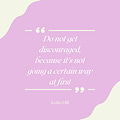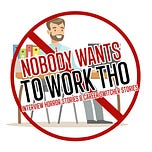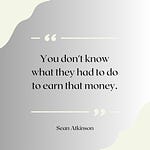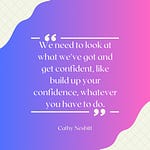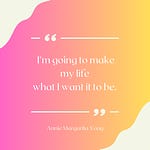About
Mia Gardner-Zambarano is a Licensed Clinical Social Worker (LCSW) and went from working for others to opening up her own private practice. She talks about life as a Social Worker in public vs private practice and all the right and wrong things she learned along the way.
Mia Gardner-Zambarano:
http://www.levielifestyle.com/
https://www.instagram.com/le_vie_psych/
Nobody Wants To Work Tho Website - https://www.nobody.chat
Subscribe To The Newsletter - https://www.switchintotech.substack.com
Listen On:
Apple Podcast - https://nobody.fyi/apple
Spotify - https://nobody.fyi/spotify
Google Podcast - https://nobody.fyi/google
Donate:
Stripe - https://nobody.fyi/donate
Cashapp - $mselyserobinson
Patreon - https://nobody.fyi/patreon
Be A Guest: https://nobody.fyi/guest
Affiliates:
Switch Into Tech - https://www.switchintotech.org
Nube: Switch Into A Cloud Career Book - https://nobody.fyi/book
Tech Freebies - https://nobody.fyi/freebies
Monthly Seminars - https://nobody.fyi/seminars
Full Tuition Scholarships - https://fullscholarships.org
Data.gal - https://www.data.gal
Alternate Titles For The Algorithm:
Public vs Private Practice As A Social Worker
Opening Up A Private Practice As A Social Worker
Working For Others As A Social Worker
Switch Your Specialty In Social Work
Show Notes
0:01
Hey y'all, this is your host Elyse Robinson. With nobody wants to work tho podcast I hope the stories were inspire you to switch careers. I was an auditor in my past life and I'm in tech, then let's get to it
0:19
we are switch into tech tech resources to accelerate your career in information technology, monthly classes on tech topics. We offer free or discounted exam vouchers, scholarships for you to meet courses, free events, free boot camps and more. You can find us at www dot switch into tech.org
0:45
Hey, y'all, this Elyse Robinson again with nobody wants to work tho. today. I have Mia and she's gonna tell us about her interesting career switch and introduce yourself Nia
0:58
Hailes. Thanks for having me on. So my name is Mia Zambrano. I am a licensed mental health therapist and a mental performance expert. So I started my journey, I guess in my initial field, I've always been a therapist. So my, my switch into different careers has kind of looked like wandering within many different sectors of being a therapist. So when I first started out, especially coming out, during and coming out of my graduate program, I was doing something called in home family therapy. And for those of you that may or may not be familiar with the field, there's actually a, like I said, a lot of different sectors you can go into, you can go into hospital settings, as a social worker or therapist, you can go into residential settings, program settings, outpatient settings, where you're seeing someone in office and school based. And one of those happens to be in home where you're literally going into people's homes, and providing therapy for the family for an individual for a child. So I did my graduate program at Boston University. And I remember when my field intern chip construct instructor pulled me in, she kind of looked at me and said, Would you be open to doing this meeting in home therapy. And I said, you know, why not? Like I didn't know any better. I was young. And I just wanted to get in the field so badly. I knew that was something I wanted to do at that point in my life really young. And it was just such an interesting experience. It was kind of enchanting. At first, it was really interesting getting to see people in their home environment. But you, you know, like a lot of jobs, you are grossly underpaid. And you are being more than super thin. And the field itself overall, there's just such a high burnout and turnover rate. I remember even those couple years I was in that one. That one environment, that one agency setting, it felt like every time we had a team meeting, someone was leaving. And at some point, I was like what's going on here? So you know, I had that experience for a number of years. And at some point, I was trying to make these transitions knowing and the narrative here was, I know, I want to do this, it just feels so intense. How do I make it work for me, but I enjoyed the work itself. But driving, it wasn't just driving to and from an office, I'm driving to an office, to someone's house to someone else's house. And I'm doing this all day long. There were times where even while I was still in grad school, I wasn't getting home till eight o'clock at night, you know, traveling all over Boston or the Boston area. So it was yeah, it was exhausting. And, and I still loved it. So I was just trying to find a way. And I think for a lot of us, it feels like we're trying to fit a circle and a square. It's like you have an idea or something that you really love doing. But the big picture like it's just not fitting completely. So that's how I started and where I continued to shift was I said, Okay, let me try the outpatient setting where maybe I'm a little bit in a school, and then I'm seeing someone in office. And even in that setting, they still had me going out and doing community work going to because they knew that was part of my background, it was a service they offered. So it took quite a bit to actually pull myself out of that. Because, you know, at least you and I talked earlier of this just kind of narrative of you're supposed to do something you're supposed to do it for a while to be able to show that you're competent, that you're gonna be successful that you can kind of earn your skin in the game, right? So it was just this narrow, like I'm young. I knew I have to keep doing this. I can't switch this early. And at some point, I remember sitting in the parking lot of my job, like, you know, maybe four years into the game, and just being like, what's, what am I doing? Why do I have to do this like this? And I took a chance I was reading actually a Gabrielle Bernstein book at the time. And it was just all about kind of trusting your gut and trying to go for the next thing giving yourself permission to do So in just knowing your worth and your value, and that's where I went to a small private practice. So where it was a stark contrast was like the nature of the work, I was doing that it was a much smaller team. But it was all in office, it was in one place, and it felt really good. And, you know, one to skip a few. Now I'm down in South Florida, and I have my own business. And, you know, that looks like a couple different things. But it's been really exciting to make it my own. And I think that was the difference was instead of me trying to fit a mold of what I was supposed to be doing in that world. It was more of me getting to do what I want to do by honoring that world, if that makes sense.
5:43
Oh, definitely. I know Boston. Wale is my first job. I work for the IRS. Oh, yeah. Boston is an amazing city. I love Oh, is calling originally from California. So okay, we're like, why are you here?
6:03
I can jersey, so it wasn't too much of a question. Okay, gotcha,
6:07
gotcha. Yeah. Yeah. Even though even the accents are kind of not far. And, you know, Boston, I say, it almost killed me. Like I say, I did time in Boston, because it was such a such a drastic change. But, but you touched on so much, you know, having to stay there to you know, get your street cred up. And I did three years in Boston, because, you know, I wanted to I was a federal worker. And so at three year mark, you have status. And so, you know, come and go as you please, and you get preference and things like that. Um, and so I had to stay, I had to stay in suffer. Yeah. Um, and eventually, I got transferred to San Diego, which I hated San Diego. Yes. At the time, they had a huge homeless population, I would get harassed every day, because I live downtown. I actually live in the street from my job. And so I could like walk to work if I want to, or take the train or the bus. And yeah, that didn't last long. Yeah. But yeah, outside of that, you know, the career switch and becoming an entrepreneur? Is isn't experience. Oh, yeah. How do you deal with, you know, the billing the clients, and, you know, accounting and everything else? Yeah, with that? Well, it
7:47
was a huge learning curve, honestly, because in a lot of the settings I was talking about, where there was comfort was, I was working for someone else. Even as as that looks like for taxes, you know, it's a lot taken off your plate, you get a sheet at the end of the year, you present it and you're good. And especially in those settings, you tend to get money back as opposed to owing money. So, you know, that's always at face value. Nice. What I will say is, I think that is part of why it took me so long to make the jump was it was this, I don't know how to do this. And I think where I kind of got lucky was, in my small practice I was talking about up in Massachusetts, you know, it was it was tight, I was technically contracted. But at some point, they made it so that we were employees of still. So I got a taste of what that looked like, what it looks like to write off expenses, what it looks like to kind of keep track of everything. And I think we're now being like fully in the trenches of being an entrepreneur and a business owner. You know, it's it's always a learning curve, because each year it's growing each year. It's changing and evolving. So, you know, I think a lot of people get discouraged because they, you know, we think we don't know how, and I think what I would say is, don't feel like you have to know everything, like there's always people to support you in that. And that's I be totally honest. Like, I'm still getting support and figuring out the logistics of everything. For sure.
9:13
Definitely, um, this is kind of deviating from my question, list, but it's on the list. Yeah. What was the catalyst that made you want to make the change? And did you have support when you made this change? Because you know, when you want to become an entrepreneur, you change careers, people think you're insane. And then now they're like, why would you give that up for that?
9:39
Yeah, no, it's true. And to your point, like there was, you know, actually, so as a therapist, it tends to be a little different. It's very rare to find a salaried position and the type of work I was doing, where you're doing outpatient, or agency setting or in home work, you tend to get paid by the hour or by home Many clients, you see by your clinical hours, so there was always a little bit of variation there. And when I saw coming from I lived in Boston to your point for about six years, after my master's and whatnot. And then I came down to Florida for a number of different reasons, mostly personal. And I actually went back into an agency setting because I kind of doubted I, you know, I don't know anybody here, it's completely new ballgame. I might as well get myself familiarized, knowing that it was very possible I could go back into a private practice setting or doing something a little bit different. And, yeah, it's, you know, the catalyst was, I used to have this might be TMI, but I had the worst stomach issues. It was to the point where like, I thought something was wrong with me, I think doctors and like, couldn't really spot it, you know. And the irony of me being a therapist was like, it was literally just the constant state of stress and pressure I was living and I didn't even realize it, and asked me last time I had any stomach issues, probably around the time, I decided to make that shift. It's not to say that I'm never stressed or anything, it's just to acknowledge that a lot of times, we don't realize how it's impacting us. And we work the majority of our lives, so and the majority of that time within our lives, right. So the catalyst for me to your question was just, why am I continuing to choose to do this this way, when I know, I could be doing it another way. And I wanted to make it my own, I, you know, I have a creative twist on things, I enjoy the material and the content and the learning aspect of what I do. And I wanted to honor that. And it was truly kind of jumping into the deep end, finally doing so and say, I know, at this point, I feel established enough. I know I'm good at what I do. I know I really enjoy what I'm doing, I have to make it work. And you know, I have had a child at that point. And it was just kind of saying, like, I'm not just doing this for me, I'm doing this for my family because I don't want to be spread so thin. I don't want to be working these types of hours. You know, I was an athlete, and I hope my for my children that they are involved in athletics or something or other and I was like, I'm not going to be able to be part of any of that, if this is my schedule. So it was kind of it was kind of at a point like a rude awakening of like, I'm not just a business professional. I'm a person. I'm a mom, my well being matters was really the big twist. And not honestly not being fully willing to let go of being a professional and really enjoying this work.
12:42
Gotcha. Gotcha. Yeah. My sister is in healthcare, so I understand it very well. She Yeah, PRN. So she's like, I'll, you know, work to three days and then have six days off. Right, ya know? So I get it and circling back to Boston. When I said it almost killed me. I said, because I, I was having eye issues. And they were like, there's nothing wrong with you. Yeah, yeah. It's just the stress, you need to quit. So I totally understand. Here's a fun question. What did you want to be when you grow up?
13:22
What did I want to be when I grew up? So it depends on when you asked me most of my life, it was a soccer professional soccer player, I and then, you know, I just I knew I wanted to be involved in sports, as long as I could. Soccer was my first love. I played it through college. I don't regret any of it. I'm not that's not to say it was easy. That's a big part of my mission as entrepreneur too. We have a separate business going up for the athletes. And it really is a platform to talk about mental health and athletes and the reality of that. And, you know, so it's kind of cool. I'm getting to live out that parallel life. And a lot of the performance and consultation I do the mental performance work I do is with athletes, in addition to entrepreneurs and business professionals. So while I am not a professional soccer player, I'm sad to report maybe someday, who knows? Probably not. But I'm getting to honor that. That piece of me ongoing by supporting that population by you know, bringing in my expertise from the therapy and psychology and evidence based practice realm, to honor that we you know, when you're asking that much of yourself physically, you're also asking that much of yourself mentally. And that population does not get that type of support. So I wanted to be a professional soccer player. And then once I hit high school age, I took a psych classes and elective and I was just like, This is what I'm gonna do. And I knew that I always knew I want to help people. I enjoyed being in a leadership role. So kind of the accumulation of all of that led to where I am now.
15:01
What was the process of going from, you know, working private, private industry to becoming an entrepreneur and having your own practice? Did you take any courses, networking going to mixers? You know, what was the process? And what did that look like?
15:22
Yeah, so I, like I said, I had a taste of it being a part of that small group practice. So that was a nice introduction. And when I really did it, when I really took the leap of going into my own world, I didn't do it alone. And I got news, you're probably wouldn't have gone the same way if I had. So I kind of worked alongside someone else who had made the same decision around the same time I did. And I'd gone to networking events, I had realized that if I try to make my expert, myself, the expert in everything, and figuring this out, I'm not gonna get anywhere. So I gave myself permission to get help in terms of, you know, website development in terms of, you know, finances in terms of all these different things, I took some courses, part of what I do is writing so I took a publishing course, I took a visibility course, you know, I'm involved in different networking groups, I think that's the biggest thing is, you know, with entrepreneurship and opening your own business, it can be very lonely, it doesn't have to be. And you tend to find that the most successful people are not alone in what they're doing. It may look like it, but they're not. And there's a lot of backdoor stuff that goes on. So, you know, initially that was the assumption was like, Oh, my gosh, how do I do this? And when I realized it doesn't have to be that way. It was almost, it was a huge relief, honestly. And I found myself being able to make leaps and strides so much differently than I probably most likely would have had. I tried to do it on my own.
16:53
Definitely, definitely. Shout out the Christian. He is my entrepreneur, buddy.
17:01
There you go. Yeah, yeah, Realty buddies.
17:05
Yeah, we can't do every day. Like he's, like right now. And we go talk about YouTube and Twitter and you know, social media, and, you know, we want to do this and this, what about this idea? You know? So yeah, you got to have an accountability partner, and you know, a person in your corner because, like you said, in your show, so lonely, um, you know, only a small percentage of people will ever take that leap and become, yeah, or, and people just really don't.
17:37
Yeah, there's an even, it's even higher percentage to your point of like, not many people do it. And then the people that do, there's such a high percentage of business owners, entrepreneurs that, you know, quote, unquote, isn't successful, or they don't sustain or stay in that world, because it's just so overwhelming. I think a big part of that is not giving yourself permission to still have a community or have a networking, you know, world or an accountability buddy, or just, again, acknowledge that you can't possibly be the expert and everything it's going to take away from the work that you're actually meant to do.
18:11
Definitely, I heard you when you said, you know, you contracted out the web development and things like that. I'm a web developer, so I do all my own website. But when it comes to I call it coloring, you know, creating logos and things like that, like, I, I don't do that stuff. So Right. So yeah, I have a person that I've been working with who like over two years at this point, so So yeah, I get you on that. Um, what are some of the positives and negatives of your new career, you kind of touched on it, you know, being entrepreneur and things like that. But what keeps you up at night?
18:54
What keeps you up all night? I'm someone who appreciates security and consistency. I'm, you know, I like to consider myself very ambitious and organized. And you know, what the things I want, of course, I want them for myself, I want them for my family, too. And I want some big picture things. When I talk about pursuing visibility. It's not just because I like being on TV or something. It's because I feel like it's it's content that everyone can benefit from. So a lot of it is how to make these things happen. And do it consistently, you know, had some incredible months. The goal is to have consistently incredible months and years and etc. So we're in the grand scheme of things. I'm still relatively new entrepreneur, that's that's kind of where the difficulties happen or like the trials and tribulations is just figuring and knowing that it is a little bit of trial and error. If we're being honest with each other, but I'd say that the positives are that I can truly make it my own. And I think that that's what a lot of people are deprived of and where they get burnt out, as again, you're trying to fit a Circle in the Square or what have you. And you don't get to make it your own, you don't get to bring in your own twist or your own true expertise or your own perspective. And it keeps me so excited and so motivated to be able to add, you know, the writing aspect of my creativity to add the speaking aspect to give different perspectives to be able to share these things to talk this way, you know, there are certainly a good amount of therapists that will go on a podcast or do different things. But there's also a ton or probably the majority that does not, and I think it's fine. And again, I'm not saying like you should do that, it's more if you want to just being able to have the space to do that. So you know, making your own schedule, being able to niche down on a certain clientele, I didn't have a say in who I saw, you know, you would have certain agencies that say like, Oh, let us know, like, if you have a preference, but guess what you're getting who's next on the waitlist, and especially if they think you're really good at something, you're gonna get the people that they think you're really good at seeing. And that's what's really cool about now is that it's just a whole nother feel to the work because you're truly connecting with the people you're working with. You're getting to kind of discern what that looks like. And you're getting to add these creative twists that make you unique. And I think that adds value really, to what you're bringing into the world.
21:22
Yeah, me laughing. You know, you don't get to pick what you want to do it.
21:26
Right? No, honestly, I mean, it's called spade a spade here. They might say that,
21:31
but when I was at Microsoft, I was like, the only one on my team that knew how to program. And they're gonna put you here and I'm like, No, I don't. I don't know. Exactly. Luckily, my Boston didn't force me to do it. But yeah, that just brought back some memories. Um, one thing that I was listening to on another podcast is that I don't know if he's the entrepreneurial trade or not. But, you know, we have all these interests. Like he said, you write you do speaking, you know, you manage your practice. And they were saying that, you know, a lot of entrepreneurs are just all over the place, or at least it looks like it's all. And people are like, like, what are you? What are you doing now? You know, and that's why you need entrepreneur buddies, because they're in that same mind frame of, I'm about to pivot this way. I'm going to try this. And you know, I'm not going to knock it because I already know what the deal is. Right? Right. Right? Um, do you find that you are all over the place? And let me add that he said in the podcast, also, that when you learn these things, and do these things, it adds to your value. And sure, no, adds to your value of being a mental health professional, or me being an auditor or accountant or, you know, a tech worker or something like that. And so do you, do you think that you're all over the place, and that is the entrepreneur mindset, or, you know, you know, what the problem is? So, so
23:08
here's the thing. And this is why I love working with people in this world, especially on the mental performance, I think, to take the dive to be an entrepreneur or business owner, it takes a certain type of drive competitiveness and personality. And for people that are truly that fueled by what they're doing to go out and do it to that extent, I think you just like that drive becomes I call it the floodgates, and I joke and like, I have some nights where I just can't sleep, because my I'm so excited about all these different ideas that I'm writing. And I'm like, in my notes section on my phone, and I see you smiling and nodding, it's like, if you're in that world, that's just how you operate a lot of the time. And, you know, there's certainly validity to knowing how to streamline that and make it so it doesn't feel all over the place. But yeah, I mean, I've learned to learn to rein myself in a little bit. But 100% Like, I can absolutely be all over the place, because you get so excited and sparked by a certain idea. And you're so all in on that. But then you're like, Oh, what about this? And, you know, again, those creative juices kind of get flowing. So what I've learned to do is on or it, listen to it, and then see how it's applicable? And is this something that's more of a hobby or like a side thing that I've just, it's for me? Or is this something that's compatible with my business? So where my writing comes in is, for the longest time? You know, kind of going back to our earlier conversation? I used to get the question all the time, like how do you do this? So it's like, and consistently just how are you doing this? Why are you doing this? This is so intense, how are you not burnt out? How do you listen, you know, to X, Y, and Z all day. And I was like, this is a great start of a blog. So I started a blog called sincerely your therapist, and I literally would talk about a therapists perspective of like, what I was doing and, you know, obviously honoring confidentiality, I wouldn't go into detail but just like how I attended my self care how I was doing what I was doing, and lead to, you know, when I was in a school system, I wrote it I published a children's book. And so like, it was always part of what I was doing. I tried to mainstream as much as I could, but I think you need to honor those creative aspects of yourself. And yeah, I think it's also important question to ask, like, is it applicable to what I'm doing? Or is this just for me? Because there's, you know, we're allowed to have hobbies, too. But yeah, I think the nature of the beast is, if you're in this world, you have a lot of drive and a lot of creativity and a lot of ideas, whether or not you see it as creativity like you, you have to kind of have that and that competitiveness, and it can certainly look like being all over the place.
25:40
Definitely, definitely. You kind of touched on a little bit, but what kind of tips and tricks would you give to someone that wanted to, you know, change their career, whether it's changed their industry, or, you know, going from audit to tech?
25:56
Right, right. I think one of the biggest things is there's so much noise, right, and we're getting everyone's highlight reel, do not get discouraged, because it's not going a certain way at first, right? I think that you know, even with, again, some of the most successful people's or entrepreneurs, you see, this one's you know, multi million or billion dollar business or whatever. It's not perfect. It's like a relationship you see the relationships on on Instagram, or Facebook, or what have you. And even the good ones like they happen lunches, we all have our stuff. So just don't compare your trenches to someone else's highlight reel, and don't let that deter you from moving forward. Another thing I would say is, I think sometimes it's like shooting a dart into the dark, is get really clear on what's important to you, not what you think is supposed to be important to you, not what mom says, or this one, or your friend, or what you should be doing or what everyone else is doing, really dial into what's important to you what your values are, what your mission is. And you'll notice a really nice growth from there. I know that's really when I hit a stride in my own life in my own career was when I was able to dial into that really specifically. And I'm not saying that's an easy process. But I think, you know, where people lose their motivation or lose their drive, or it's not consistent as you lose track of that, why? And I know a lot of people talk about having a y, but what does that truly mean? It really is giving yourself permission in this life. What's important to me, and what do I want to do? And why do I want to do that? So I think like, you know, the combination of giving yourself your permission to have your own process and not comparing, instead using that as motivation or, or, again, accountability. And then also just getting really clear on what that looks like for you in terms of why you want to do that. I think those are two really important aspects of getting started honestly.
27:52
Definitely, definitely. So basically should make sure you don't keep up with the Joneses. Yeah, brace for no one yellow and map out a plan. Yeah, yeah. So you're not all over the place and right, have a goal and you know, you you set the first goal get there, and then you keep going, going, going, going? For sure. So you get to the last stop. And yeah, any any last words promotion website?
28:23
Yeah, no, if you are someone that is new in your career or wanting make the shift, or you just feeling motivated that again, I work with, you know, highly driven highly competitive professionals that just know they could be doing more aren't sure how are you have these mental blocks with these errors? Like I can't, I don't know how. So that's what I specialize in, in my performance work. Again, I still do the therapy work individually. And my my bread and butter right now is definitely helping with the performance aspect. I love someone who's, who knows they want to do something knows they want to go after it's just looking for the how or the emotional kind of pathway like we were talking about to like how to overcome the stress, the anxiety, the performance, anxiety, the comparison, the self doubt, whatever that is. So I do a lot of work there. And you could get in touch with me on Instagram. I'm at a l e underscore V I E underscore Psych. P S ych. And on my website, you could find me at Lavy lifestyle.com. And I'm on LinkedIn as well via Gartner dash sembrano. So there's a number of places you could find me, and I'd be happy to chat. I do you know, free consultations. And yeah, I look forward to hearing from any of you if you have questions or just want to connect further.
29:48
All right, thank you Mia for coming on the podcast. My name is Elyse Robinson that nobody wants to work though. And see you guys next time and thank you for subscribing.

